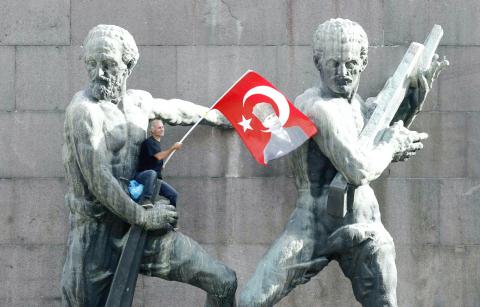Turkish Prime Minister Recep Tayyip Erdogan yesterday rejected talk of a “Turkish Spring,” facing down the worst protests in his decade-long rule as fresh clashes erupted between police and demonstrators in Ankara.
Erdogan defied protesters who accuse him of seeking to impose conservative Islamic reforms on secular Turkey, stressing that he was democratically elected.
“Was there a multi-party system in the Arab Spring countries?” he said in televised comments.

Photo: Reuters
Photographers in Ankara later saw police fire tear gas and use water cannon to disperse stone-throwing demonstrators on the fourth day of violent protests that have swept scores of Turkish cities.
Rights groups say hundreds have been wounded in clashes nationwide that have pitted stone-throwing protesters against riot police firing tear gas and water cannons since Friday last week.
Turkish President Abdullah Gul yesterday urged calm and promised protesters that their voice had been heard.
“The messages delivered with good intentions have been received,” he was quoted as saying by Anatolia news agency.
Erdogan struck a harder tone, saying: “We will stand firm. We’ll overcome this.”
With Turkey’s allies calling for restraint and international human rights groups denouncing the police crackdown, Gul acknowledged the demonstrators’ right to protest, but called for an end to the clashes.
“Democracy does not only mean elections,” he said, adding: “I am calling on all my citizens to abide by the rules, and state their objections and views in a peaceful way, as they have already done.”
Erdogan had earlier denounced demonstrators as “vandals.”
He also lashed out at the social messaging service Twitter, used by many of the protesters.
“There is a troublemaker called Twitter, the worst of lies are in there,” he told the Haberturk television channel on Sunday, citing false tweets about attacks against protesters and fatalities.

SECURITY: As China is ‘reshaping’ Hong Kong’s population, Taiwan must raise the eligibility threshold for applications from Hong Kongers, Chiu Chui-cheng said When Hong Kong and Macau citizens apply for residency in Taiwan, it would be under a new category that includes a “national security observation period,” Mainland Affairs Council (MAC) Minister Chiu Chui-cheng (邱垂正) said yesterday. President William Lai (賴清德) on March 13 announced 17 strategies to counter China’s aggression toward Taiwan, including incorporating national security considerations into the review process for residency applications from Hong Kong and Macau citizens. The situation in Hong Kong is constantly changing, Chiu said to media yesterday on the sidelines of the Taipei Technology Run hosted by the Taipei Neihu Technology Park Development Association. With

CARROT AND STICK: While unrelenting in its military threats, China attracted nearly 40,000 Taiwanese to over 400 business events last year Nearly 40,000 Taiwanese last year joined industry events in China, such as conferences and trade fairs, supported by the Chinese government, a study showed yesterday, as Beijing ramps up a charm offensive toward Taipei alongside military pressure. China has long taken a carrot-and-stick approach to Taiwan, threatening it with the prospect of military action while reaching out to those it believes are amenable to Beijing’s point of view. Taiwanese security officials are wary of what they see as Beijing’s influence campaigns to sway public opinion after Taipei and Beijing gradually resumed travel links halted by the COVID-19 pandemic, but the scale of

A US Marine Corps regiment equipped with Naval Strike Missiles (NSM) is set to participate in the upcoming Balikatan 25 exercise in the Luzon Strait, marking the system’s first-ever deployment in the Philippines. US and Philippine officials have separately confirmed that the Navy Marine Expeditionary Ship Interdiction System (NMESIS) — the mobile launch platform for the Naval Strike Missile — would take part in the joint exercise. The missiles are being deployed to “a strategic first island chain chokepoint” in the waters between Taiwan proper and the Philippines, US-based Naval News reported. “The Luzon Strait and Bashi Channel represent a critical access

Pope Francis is be laid to rest on Saturday after lying in state for three days in St Peter’s Basilica, where the faithful are expected to flock to pay their respects to history’s first Latin American pontiff. The cardinals met yesterday in the Vatican’s synod hall to chart the next steps before a conclave begins to choose Francis’ successor, as condolences poured in from around the world. According to current norms, the conclave must begin between May 5 and 10. The cardinals set the funeral for Saturday at 10am in St Peter’s Square, to be celebrated by the dean of the College